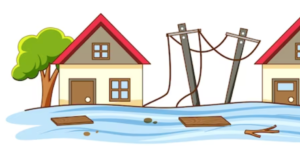The IICRC S500 is a standard for professional water damage restoration.

Importance of removing wet materials ACCORDING TO PROFESSIONAL WATER DAMAGE RESTORATION:
- Prevents mold growth: Wet materials provide the perfect environment for mold to grow, which can cause health problems and further damage the building.
- Facilitates drying: Removing wet materials exposes the affected area to airflow, allowing it to dry more quickly and thoroughly.
- Prevents structural damage: Wet materials can cause structural damage over time, and removing them can help prevent long-term damage to the building.
Pros of removing wet materials:
- Improved air quality: Removing wet materials can improve indoor air quality by reducing mold and mildew.
- Reduced risk of further damage: By removing wet materials, you can reduce the risk of further damage to the building, such as the warping or buckling of flooring.
- Improved appearance: Removing wet materials can enhance the appearance of the affected area and restore it to its original condition.
Cons of removing wet materials:
- Increased cost: Removing wet materials is more expensive than simply drying them out, as it requires additional labor and materials.
- Disruptive process: Removing wet materials can be disruptive, as it may involve demolition and reconstruction.
Where to consult:
- IICRC-certified professionals: The best resource for information on the IICRC S500 standard is an IICRC-certified professional
- Building professionals: If you are unsure whether removing wet materials is necessary, consult a building professional
- Building codes and regulations: It is also essential to familiarize yourself with local building codes and regulations, which may have specific requirements for removing wet materials after a water leak.
It’s important to be cautious and discerning when choosing a professional for water damage restoration,
as not all service providers may be reliable or qualified. To avoid working with unreliable providers, consider the following:
- Verify credentials: Check that the provider is certified by the IICRC or another reputable organization and has the necessary licenses and insurance.
- Check references and reviews: Ask for references from past clients, and read online reviews to get a sense of the provider’s quality of work and customer service.
- Get multiple quotes from several providers to compare prices and services, and choose the one that best fits your needs and budget.
- Be wary of low prices: Be cautious of providers who offer significantly lower prices than others, as this may indicate that they are cutting corners or using subpar materials.
In general, it’s always best to do your research and choose a reputable, qualified professional for to ensure the best outcome.


